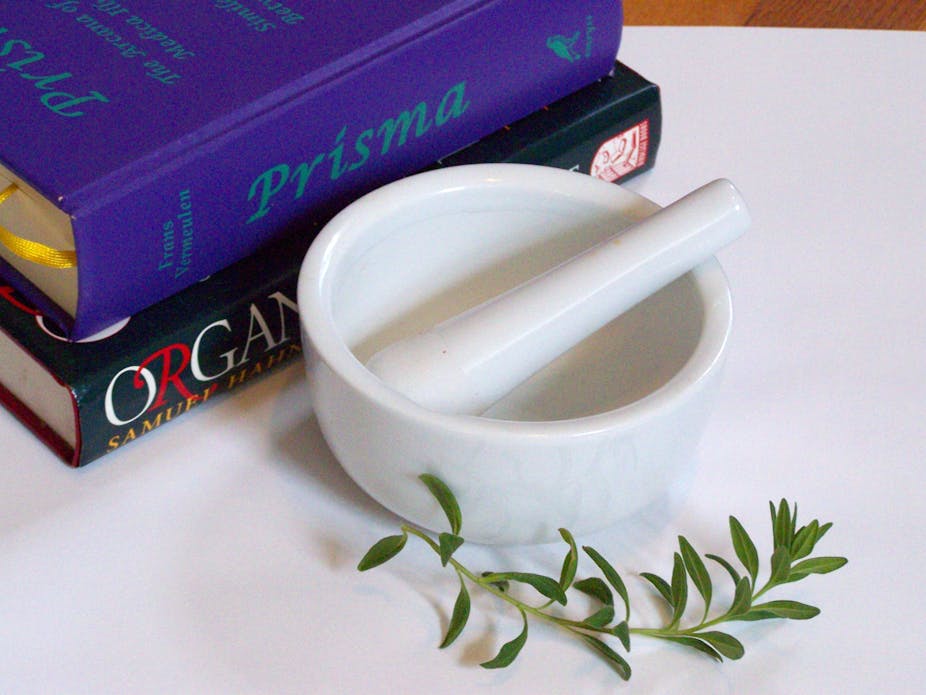The National Health and Medical Research Council (NHMRC) recently completed a review of the evidence for homeopathy’s effectiveness and, after analysing systematic reviews of clinical trials, concluded there was “no reliable evidence for homeopathy and that it cannot demonstrate efficacy.”
To judge the efficacy, and hence the value, of homeopathy on the basis of randomised controlled trials misses the point. Such trials are the gold standard for conventional drugs because they test a medication’s effect across a population, eliminating placebo effects and other forms of perception bias.
But – and here’s the crux – homeopathic medicines are not drugs and homeopathy involves much more than the use of a particular therapy. People don’t visit a homeopath wanting a drug, in fact they often quite deliberately don’t want one; they want individualised treatment.
A randomised controlled trial will tell you exactly nothing about an individual’s experience of a drug. Whereas homeopathy (in which medicines often play a relatively minor role in a complex regimen of care that may include lifestyle modification, diet, exercise and critical self-reflection) is aimed explicitly at how illness is unique to a particular body, experience, and history.
Randomised controlled trial evidence in support of homeopathy is clearly weak. But there are other valid forms of evidence, largely excluded from the NHMRC report, including case studies, patient reports of satisfaction and quality of life, and observational studies. Here, homeopathy does much better.
And while it’s true these studies cannot eliminate the placebo effect and other forms of perception bias, that may also be in homeopathy’s favour. To understand this, we need to consider why people consult homeopaths.
More than placebo
Condemnations of homeopathy suggest homeopaths and the people who consult them are either foolish, deluded or corrupt. But this is patronising and inaccurate.
Most homeopaths, like most doctors, practice in good faith and according to broadly shared ethical principles and virtues. And the people who consult them consistently report benefit from homeopathy. How can this be the case if homeopathy has no effect?
Homeopaths often spend an hour or two in a single consultation to create a caring, therapeutic relationship with their patients. This alone can be powerful – physician empathy is a valid clinical tool that not only contributes to patient satisfaction, but has been demonstrated to improve treatment outcomes.
Is this just placebo? What’s wrong with it if that is so? Even though some studies suggest greater than placebo benefits in homeopathy, the real question is how we define what constitutes the placebo effect and what we regard as legitimate effects of health professional-patient interactions.
Homeopathy may generate positive lifestyle changes for patients, or a range of other powerful outcomes that we’re only just starting to understand as part of what are now referred to as “context” effects – or both.
Indeed, homeopathy may work a lot of the time for reasons that conventional scientific medicine has thus far lacked the conceptual tools to explain. And it may have nothing to do with homeopathy’s theoretical explanations or the effects of highly dilute substances.
Efficacy and harms
People seek out homeopathy for many reasons, including dissatisfaction with conventional medicine (or a lack of benefit from it) or wanting an alternative form of care that’s tailored to them. Many benefit, reporting greater satisfaction and well-being with homeopathy than with conventional medicine alone and fewer adverse effects, and feel they’re respected and cared for.
In terms of harms, concerns include money being spent on inefficacious medicines and harms from inappropriately ignoring established and effective conventional treatments.
In an open market, people have the right to make the choices they see fit. We don’t stop people studying or paying to seek solace from all sorts of non-scientific spiritual practices as they choose, not to mention buying all kinds of widely advertised and sold products that we might judge as being, at best, unhelpful to their health. So why object to the consumption of homeopathic treatments?
For possible harms stemming from not seeking or delaying appropriate conventional medicine, the ethical and educational requirements for practicing homeopaths must include referral for disease such as infectious illnesses, cancer and cases where symptoms worsen significantly despite treatment.
Most homeopaths behave ethically and with integrity in these cases. Indeed, homeopaths often find themselves wrestling with complex ethical dilemmas in instances where patients resist conventional treatment.
It would help if conventional doctors were more tolerant of homeopathy in these situations, allowing support for patient preferences and sustaining access to both forms of care. This would help support homeopaths’ professional development as well, and they’re likely to be more responsive if they don’t need to be defensive.
Assessing homeopathy with evidence that doesn’t distinguish the unique quality or complexity of individual patient experience is to do it an injustice. And to pretend evidence is not varying and complex, and that only certain kinds of evidence count, is the wrong way to defend science.
It also sets up unrealisable expectations that scientific medicine will always be “correct”. Since medicine is an uncertain business, that’s a recipe for disillusionment when things go wrong, and for propelling people into the arms of alternative practices.

